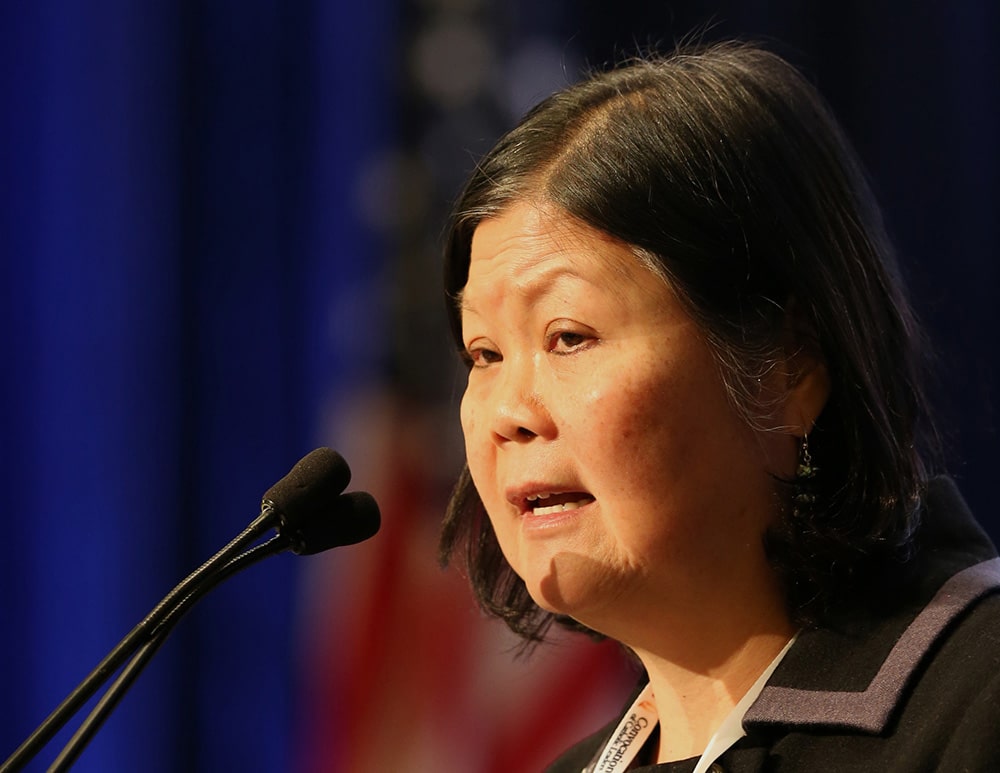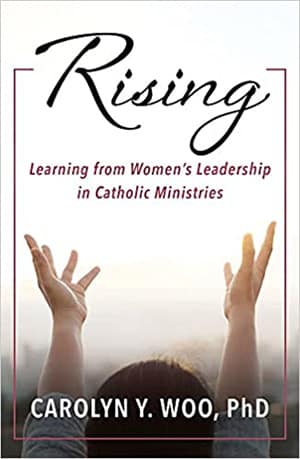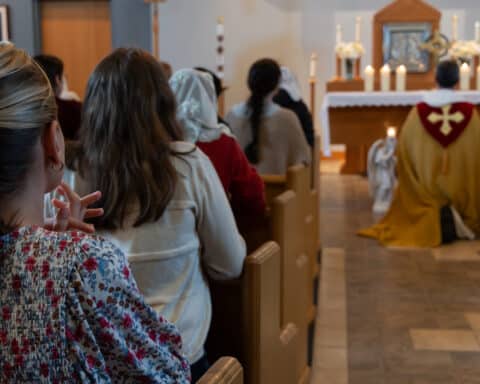In her new book, “Rising: Learning from Women’s Leadership in Catholic Ministries” (Orbis Books, $21), scheduled to be released March 15, author Carolyn Y. Woo, Ph.D., takes on a topic that is often deemed controversial: the role of women leaders in the Church. Woo, former dean of the University of Notre Dame’s Mendoza College of Business, past CEO and president of Catholic Relief Services and a member of OSV’s board of directors, invited first-person narratives from a broad cross-section of women leaders to compliment her own writings. In a recent email interview with Our Sunday Visitor, Woo shared her thoughts on the book and the topic of women’s leadership in the Church.
Our Sunday Visitor: Carolyn, congratulations on the publication of “Rising: Learning from Women’s Leadership in Catholic Ministries.” Can you briefly introduce yourself and your family to our readers?
Carolyn Y. Woo: I was born and raised in Hong Kong as the fifth child and fourth daughter among six children. I was not the hoped-for second son. My brothers were pretty much mandated to be a doctor and a lawyer. The girls’ future would be to marry well with no plans and resources for our education beyond high school. I saw higher education as my escape. As my parents left everything behind in China when the Communist revolution took hold, I internalized the care of my family as my major responsibility. I needed an education to serve this purpose. I was able to raise funds for exactly one year of tuition and residence at Purdue University. Accepting my first year as my only exposure to higher education for me, I fit in 42 credit hours and applied for a full scholarship. The rest, as they say, is history. I never took learning for granted and approached every new assignment as the ticket to the arenas of knowing and doing. I had no other keys for unlocking that world. I did not aim for success; I just wanted a seat and a chance.
My faith grew amidst the Maryknoll Sisters who ran the school at which I spent grades one to 12. The sisters helped us develop a voice from reading, reflecting, assessing and communicating. The Maryknoll Sisters, by their ministries, challenged us to use our voice, our privileged position and education for others — the poor, the marginalized and the lowest in society. God became real to me because God was real to the sisters. Faith was, above all, joyful. In all endeavors, I was told, God is with us. When I felt I was totally on my own, I heeded the sisters and made daily Mass a routine.
| MORE INFO |
|---|
|
|
My empathy for women’s lives, particularly in developing countries, came from these early years. I was raised by very strong women in powerless situations. When I was asked to lead Catholic Relief Services, I felt like I was coming home to the many families, women, children, men displaced, powerless in society, facing turmoil and operating with little resources. I saw the fruitful outcomes of their struggles gained from grit, commitment, resilience, mutual care, intelligence and, above all, love.
Today, my faith is inspired by the incredible goodness, generosity and grace in people. Each kindness is an experience and witness of God’s presence. For me, it is God popping in to say hello and place a squeeze on the shoulder to go forth with hope and in the Holy Spirit.
Our Sunday Visitor: Your new book, “Rising,” amplifies the voices of a vast array of women who are active in Church leadership. What inspired you to take on this topic at this point in your own leadership journey?
Woo: I am deeply concerned about the portrayal of women’s roles and their impact in the Catholic Church. Because leadership in the Catholic Church is often identified with sacramental ministry and women cannot be ordained, it is widely held that women have no influence in the Church. This view is not only incomplete, it leads to decisions and actions that bypass serious reflection by women as to how they could use their gifts to build and serve the Body of Christ.
I find the understatement of women’s influence and leadership misleading and unjust with damaging consequences. COVID canceled all my travels so that I could sit still and write this book. I feel a responsibility to take on this misperception based on the extensive experiences I have had with many women leaders of Catholic ministries.
Our Sunday Visitor: Before we dive into the book, would you please highlight some of the statistics you share on existing women leaders, both religious and lay, in today’s Church?
Woo: From 2011 to 2021, the percent of women CEOs in Catholic health systems rose from 27 to 34%. Also:
-
- Of Catholic universities which are members of the American Catholic Colleges and Universities, 34% are led by women.
- As of 2021, the percentages of women serving as staff, principals and superintendents of Catholic schools are 77, 67 and 49%, respectively.
- Of the local Catholic Charities agencies, 47% are led by women.
- Of the 854 members of the Catholic Media Association, 462 are women with 200 holding titles of president, editor, vice president, director, coordinator and manager.
These statistics can be contrasted with:
-
- In 2021, 41 companies were led by women CEOs among the Fortune 500 (8%).
- Of the top 200 international universities, 41 are led by women presidents (20%).
Our Sunday Visitor: You highlight common misperceptions about women’s leadership in the Catholic Church. Can you share a few of these and explain why you hope they will not be sticking points for women looking to serve the Church?
Woo: I discussed four misperceptions:
1. Few leadership opportunities are available to women in Catholic ministries. The statistics presented earlier illustrate that women leaders represent a third to slightly less than half of various social, educational, health and communication ministries. These percentages are higher than leading corporations (8%) and universities (20%). In diocesan offices, women serve as chancellors, chief operating officers, general counsel, chief financial officers or planning directors. All these are positions with significant influence, scope and decision-making authority.
2. Church leaders do not advocate for women’s leadership in Catholic ministries. Over the last 50 years, despite — or because of — the foreclosure of priestly ordination to women, the Vatican has explicitly proclaimed the gifts, contributions and importance of women. By Pope St. Paul VI, Pope St. John Paul II, Pope Benedict and Pope Francis, the attributes and impact of women have been lauded and signified in different speeches and documents. These have been captured under a general conception of the femine genius.
An example is cited from Pope John Paul II’s letter to women on June 29, 1995: “In this vast domain of service, the Church’s two-thousand-year history, for all its historical conditioning, has truly experienced the ‘genius of women’; from the heart of the Church there have emerged women of the highest caliber who have left an impressive and beneficial mark in history. … And now can we overlook the many women, inspired by faith, who were responsible for initiatives of extraordinary social importance, especially in serving the poorest of the poor? The life of the Church in the Third Millennium will certainly not be lacking in new and surprising manifestations of the ‘feminine genius.'”
There is also the recognition that progress has been slow and that much more needs to be done. In the meantime, the Vatican has made noticeable appointments of women to senior positions. In August 2020, six women among a total of seven laypeople were appointed to the Council for the Economy, which oversees Vatican finances and budgets. In 2021, Pope Francis appointed women as undersecretary of the Synod of Bishops, secretary of the Vatican Biblical Commission, head of the office of the Pontifical Commission for Latin America, interim secretary of the Dicastery for Promoting Integral Human Development, and secretary-general of the Governorship of Vatican City State.
3. Lay ministry is subordinate to ordained ministry. Many laypeople, men and women alike, presume incorrectly that their ministries are subordinate to those of ordained ministers. Few recognize that laypeople share a responsibility with the clergy in proclaiming the Good News, bearing witness to the Gospel and serving those in need. This point is made in the Second Vatican Council, emphasized by Pope Benedict XVI in his call for co-responsibility, and by Pope Francis in his critique of clericalism. Jesus gave us his body as sacrament, and he also asked Peter to feed and tend his sheep. Both ordained and lay ministries are ways to cooperate with God to make God’s love and presence known.
4. Women are not well-suited for leadership roles in Catholic ministries. Unfortunately, held by both men and women, stereotypes abound relating to women in leadership: Women belong in the home; they are better as volunteers; they may not be equipped to deal with hard decisions; they do not have enough experience to lead, etc. These generalizations should be challenged.
Our Sunday Visitor: What are a few of the most common attributes of women leaders?
Carolyn Y. Woo: I observe five common attributes demonstrated by the women leaders in the book: They are compelled to serve those in need; they are committed to their staff; they take ownership of problems; they seek to bridge and heal differences; their work is rooted in faith.
Women should be included in leadership roles for their abilities, commitment and relevant life experiences.
Our Sunday Visitor: What are a few of the most pressing challenges facing women leaders in the Church?
Carolyn Y. Woo: Co-responsibility of laypeople and clergy is still unfolding, oftentimes with greater difficulty in parishes than in social, education and health ministries. Governance of parishes tends to pivot on the pastor whose preferences can undo programs and positions. Pay and access to the pastor in some situations still favor male colleagues. Larger ministries with well-established governance structures offer accountability and clearer definition of roles and responsibilities. Still, women leaders tend to be outsiders who have not grown up with the organization, nor within the clerical and episcopal cultures that permeate the respective ministries. Most clergy do not have experience working with or for women. Therefore, it is important to resist labeling and stereotyping, and lean on time, patience and grace to cultivate understanding, respect and collaboration.
Our Sunday Visitor: One highlight of “Rising” is the variety of women contributors who share their perspectives. How did you select the women who have contributed essays?
Carolyn Y. Woo: In selecting the women contributors to the book, the requisite element is that they have experience as leaders responsible for the direction, operation, personnel and mission fulfillment of a ministry. After this, I wanted a range of ages, inclusion of both religious sisters and laywomen, a cross-section of ministries, different ethnicities, regions of the country and board members for their leadership through governance.
Our Sunday Visitor: With an increasing societal emphasis on the value of diverse perspectives, how can the Church be more mindful of inclusivity and the amplification of diverse women’s voices?
Carolyn Y. Woo: On diversity, many people and advisories begin with the “hows.” I think that is the second step. First must be a sincere assessment of how much and why we want diversity. Do we seek it because it is no longer acceptable to ignore it? Do we approach it as just another organizational initiative that comes and goes while demanding more work, more consultation, more iterations, more efforts?
Diversity, in some ways, is like welcoming in-laws into the family. Do we mainly try to orient a new family member to our way of doing things? Or do we welcome the potential changes in perspectives, traditions and styles, which will likely mix things up a bit, disrupt existing patterns and occasionally ruffle feathers? We only choose the latter when we love the new member, recognize the blessing from the addition and are truly excited about getting to know, learn from and share with a new member. When the desire is genuine and strong, ideas and energy for action will emerge.
Lisa Hendey writes from California.






